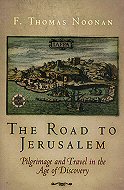The road to Jerusalem :
Pilgrimage and Travel in the age of discovery
|
|
Thomas Noonan
|

|

The history of early modern travel is captured in its volatile and evolving literature. From the middle of the 1400s, what had been for centuries a travel literature of pilgrimage to the Holy Land underwent two "modernizations" in rapid succession. The first, in the wake of Gutenberg, was the casting or recasting of pilgrims' accounts in the new medium of print. By the waning of the fifteenth century, such printed literature had reconfirmed and enhanced long-distance pilgrimage as the primary narrative of European travel. The second, forged by the great discoveries and reformations of the sixteenth century, reworked and enlarged, again in the revolutionary medium of print, the very content of European travel. Travel and its literature ceased to be simply, or even largely, a matter of pilgrimage to the Levant. The labors of Columbus, Cortes, and Magellan, but also of Luther, Zwingli, and Calvin, had altered the appearance, complicated the ambitions, and shifted the focus of much European travel.
The Road to Jerusalem traces the survival of the literature of pilgrimage as part of the literature of travel from the late fifteenth to the eighteenth century, when powerful forces ranging from navigation to theology were redefining what it meant to go abroad. Accounts of discovery, exploration, scientific expeditions, tours, and other species of travel crowded a field that had once been dominated by accounts of pilgrimage. […]
F. Thomas Noonan is European History Specialist, Rare Book and Special Collections Division, at the Library of Congress. He is the author of Houghton Library: The Collection and Reading Room and The Dark Side of the Enlightenment.
|
|
